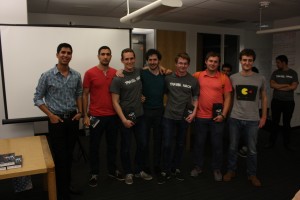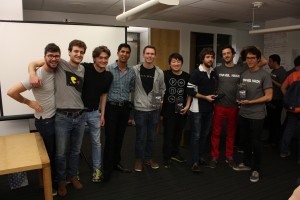Travel Hackathon
The students of Sutardja Center for Entrepreneurship & Technology (SCET) teamed up with HEC Paris at Berkeley to present the first international Travel Hackathon on April 11. Students collaborated in teams to develop solutions to the hassles that everyone experiences while traveling. The event was co-hosted by ITS and HEC Paris. Luke Kim, Arjun Ghai, and Lauren Hanlon of CETSA and Romain Lapeyre, Ambroise Collon, and Valentin Perret of HEC ran the Hack on the ground. Traveling Spoon, a San Francisco startup that connects travelers with local food experiences around the world, paid-it-forward to The Center by helping to fund the event. Steph Lawrence, co-founder of Traveling Spoon, served as one of the judges for the Hackathon. The other sponsors of the event include: Amadeus, CRN, HEC, Sutardja Center, and ITS Tech Transfer.
Finalists: Neil; WeFi
Semi-Finalists: Be Local; Pop My Train
Finalist: Most Potential
WeFi proposed the first global WiFi sharing community to resolve both Internet and data roaming complications that often accompany traveling. Their pitch was based on the idea that the Internet is everywhere; we just have to share it. Their business model proposed a decreased price of ten cents per megabyte for the user. The homeowner sharing their WiFi would receive a portion of this fee as incentive.

From Left to Right: Arjun Ghai, Armand Dolui, Arthur Menard, Vianney Copleutre, Philip Tsukanov (Photo Credit: Erwn Le Guennec)
Finalist: Most Creative
The Neil team, inspired by the gold coin in their envelope, pitched an idea to essentially eliminate currency using Bit Coin technology and a universal bankcard. The group approached Hackathon by proposing a solution to a personal struggle of theirs—namely, that dealing with currency while traveling “is a nightmare.” They met the CEO of Lending Club and liked the idea of changing one sector of the banking system. They built on this idea and emerged with their final idea for Neil.

From Left to Right: Valentin Perret, Romain Lapeyre, Ambroise Collon, Arjun Ghai, Michael Pletta, Simon Cao, Benjamin Chino, Francois de Fitte, Nicolas Ruffier des Aimes (Photo Credit: Erwan Le Guennec)
The Be Local team found that, more often than not, travelers did not meet any locals on their trips and they pitched an idea to resolve this problem using a phone app. This team won major points for creativity and resolve because they did not have a laptop or computer with which to work. They overcame this challenge by drawing their projected app images on large posters to show the judges.
The members of Pop My Train found inspiration in the subway ticket in their envelope and pitched an idea to resolve train energy consumption through an iPad consulting application. The app would assess slope, speed, and wind conditions and advise the train driver to brake, coast, or accelerate. The projected savings just for one train company in France were 97.5 million Euros.
